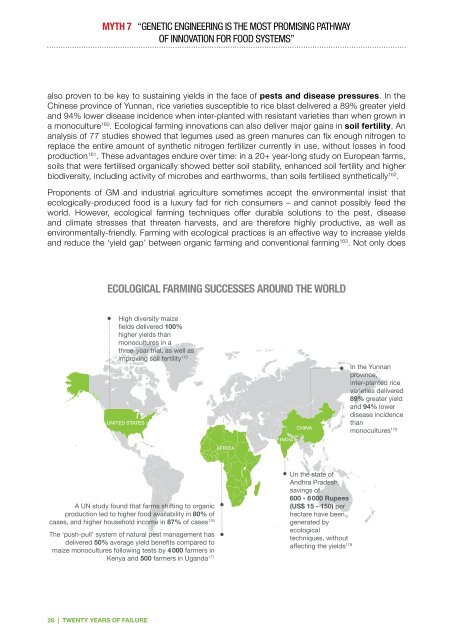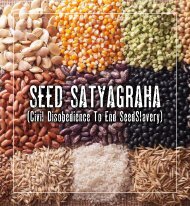Twenty years of failure
2cPDqsHeb
2cPDqsHeb
Create successful ePaper yourself
Turn your PDF publications into a flip-book with our unique Google optimized e-Paper software.
MYTH 7 “GENETIC ENGINEERING IS THE MOST PROMISING PATHWAY<br />
OF INNOVATION FOR FOOD SYSTEMS”<br />
also proven to be key to sustaining yields in the face <strong>of</strong> pests and disease pressures. In the<br />
Chinese province <strong>of</strong> Yunnan, rice varieties susceptible to rice blast delivered a 89% greater yield<br />
and 94% lower disease incidence when inter-planted with resistant varieties than when grown in<br />
a monoculture 160 . Ecological farming innovations can also deliver major gains in soil fertility. An<br />
analysis <strong>of</strong> 77 studies showed that legumes used as green manures can fix enough nitrogen to<br />
replace the entire amount <strong>of</strong> synthetic nitrogen fertilizer currently in use, without losses in food<br />
production 161 . These advantages endure over time: in a 20+ year-long study on European farms,<br />
soils that were fertilised organically showed better soil stability, enhanced soil fertility and higher<br />
biodiversity, including activity <strong>of</strong> microbes and earthworms, than soils fertilised synthetically 162 .<br />
Proponents <strong>of</strong> GM and industrial agriculture sometimes accept the environmental insist that<br />
ecologically-produced food is a luxury fad for rich consumers – and cannot possibly feed the<br />
world. However, ecological farming techniques <strong>of</strong>fer durable solutions to the pest, disease<br />
and climate stresses that threaten harvests, and are therefore highly productive, as well as<br />
environmentally-friendly. Farming with ecological practices is an effective way to increase yields<br />
and reduce the ‘yield gap’ between organic farming and conventional farming 163 . Not only does<br />
ECOLOGICAL FARMING SUCCESSES AROUND THE WORLD<br />
High diversity maize<br />
fields delivered 100%<br />
higher yields than<br />
monocultures in a<br />
three-year trial, as well as<br />
improving soil fertility 175<br />
UNITED STATES<br />
INDIA<br />
CHINA<br />
In the Yunnan<br />
province,<br />
inter-planted rice<br />
varieties delivered<br />
89% greater yield<br />
and 94% lower<br />
disease incidence<br />
than<br />
monocultures 179<br />
AFRICA<br />
A UN study found that farms shifting to organic<br />
production led to higher food availability in 80% <strong>of</strong><br />
cases, and higher household income in 87% <strong>of</strong> cases 176<br />
The ‘push-pull’ system <strong>of</strong> natural pest management has<br />
delivered 50% average yield benefits compared to<br />
maize monocultures following tests by 4 000 farmers in<br />
Kenya and 500 farmers in Uganda 177<br />
Un the state <strong>of</strong><br />
Andhra Pradesh,<br />
savings <strong>of</strong><br />
600 - 6 000 Rupees<br />
(US$ 15 - 150) per<br />
hectare have been<br />
generated by<br />
ecological<br />
techniques, without<br />
affecting the yields 178<br />
28 | TWENTY YEARS OF FAILURE



